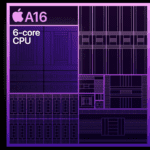
As expected, with the iPhone 14 and the new Pro models, Apple has only made a “half” generation leap in terms of processors. The new Apple A16 Bionic is only in the expensive Pro versions. A benchmark should now show that the increase in performance is surprisingly limited.
A new Entry on Geekbench is to show the results of a test run with the new iPhone 14 Pro, in which the new Apple A16 Bionic is used. Compared to last year’s iPhones, the increase in performance is not as high as Apple might want customers to think.
According to the screenshot, the alleged iPhone 14 Pro scored 1879 points in the single and 4664 points in the multi-core score. If you now compare these values with the Apple iPhone 13 Pro Max, with the fastest version of the Apple A15 Bionic, this model came up with 1734 (single-core) and 4818 points (multi-core), for example. In this comparison, the performance per core is definitely a bit higher, but it does not rise overwhelmingly.
It can also be assumed that the first benchmark results should come from a pre-series device unless it is a fake anyway. Apple has probably made some changes in the meantime, which include optimizing performance so that the scores mentioned are anything but final. The Apple A16 Bionic shouldn’t bring any major changes in terms of the CPU, as the chip still has two high- and four low-performance cores.
However, it is now being manufactured on a 4-nanometer scale before a larger leap can be expected next year with the next generation of chips. Compared to another smartphone CPUs, Apple is also way ahead with the new chip – which is still the case with the Apple A15 from the iPhone 13 more than a year after its introduction.
Digital marketing enthusiast and industry professional in Digital technologies, Technology News, Mobile phones, software, gadgets with vast experience in the tech industry, I have a keen interest in technology, News breaking.